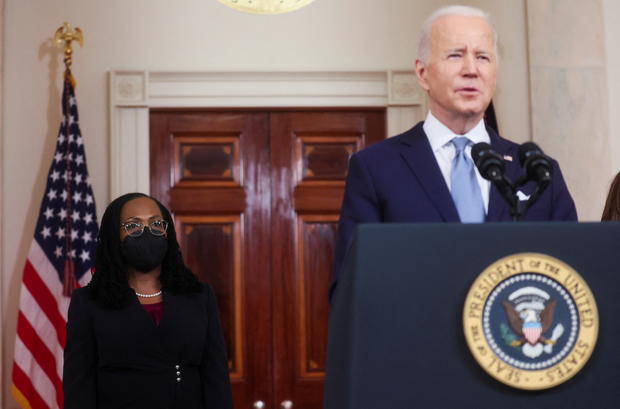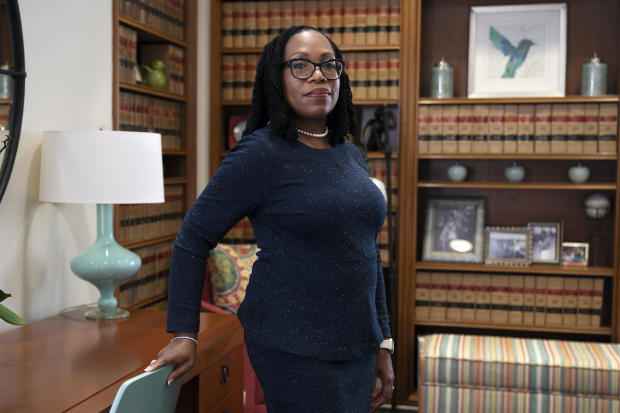Washington — President Biden will nominate federal appeals court Judge Ketanji Brown Jackson to replace retiring Justice Stephen Breyer on the Supreme Court, he announced Friday, fulfilling his campaign pledge to name the first Black woman to the nation’s highest court.
Mr. Biden formally announced Jackson, 51, as his pick during an event at the White House alongside Vice President Kamala Harris, setting in motion a confirmation battle in the Senate that will play out amid Democrats’ efforts to maintain their majorities in Congress in November’s midterm elections.
“For too long, our government and our courts haven’t looked like America, and I believe it’s time that we have a court that reflects the full talents and greatness of our nation with a nominee of extraordinary qualifications, and that we inspire all young people to believe that they can one day serve their country at the highest level,” the president said during remarks announcing Jackson as his Supreme Court nominee.
Mr. Biden hailed Jackson as a “proven consensus builder, an accomplished lawyer, a distinguished jurist on one of the nation’s most prestigious courts,” and said she is “uniquely accomplished,” with a wide-ranging background that includes jobs in public service and private practice.
“Her opinions are always carefully reasoned, tethered to precedent and demonstrate respect for how the law impacts everyday people,” the president said. “It doesn’t mean she puts her thumb on the scale of justice one way or another, but she understands the broader impact of her decisions.”
In remarks following Mr. Biden, Jackson paid homage to her husband, Patrick, daughters and family, and offered a message to Breyer, telling him that while the Senate will decide whether she fills his seat on the court, “I could never fill your shoes.”
“If I am fortunate enough to be confirmed as the next associate justice of the Supreme Court of the United States, I can only hope that my life and career, my love of this country and the constitution, and my commitment to upholding the rule of law and sacred principles upon which this great nation was founded will inspire future generations of Americans,” she said.
With Republicans and Democrats each controlling 50 seats in the Senate and Harris casting tie-breaking votes, Jackson will need support from all 50 Democrats — if GOP senators oppose her nomination — in order to be confirmed to the Supreme Court, which she is expected to receive.
It’s unclear when confirmation hearings in the Senate Judiciary Committee will begin, but committee Chairman Dick Durbin said in a statement the panel will “begin immediately to move forward” on Jackson’s nomination. Majority Leader Chuck Schumer said in a statement that Senate Democrats “will work to ensure a fair, timely, and expeditious process — fair to the nominee, to the Senate, and to the American public.”
LEAH MILLIS / REUTERS
The pace of the confirmation process for Jackson is expected to be similar to that of Justice Amy Coney Barrett, whose nomination to replace the late Justice Ruth Bader Ginsburg in 2020 was approved by the GOP-controlled Senate in less than 30 days.
Jackson will be guided through the confirmation process by former Alabama Senator Doug Jones, who is serving as her so-called “Sherpa.”
Senate Democrats swiftly applauded Mr. Biden for his historic nomination and offered widespread praise for Jackson. Schumer said that with her “exceptional qualifications and record of evenhandedness,” she will “uphold the constitution and protect the rights of all Americans, including the voiceless and vulnerable.” Durbin called Jackson “an extraordinary nominee” with “an exceptional life story. “
Republicans, meanwhile, indicated they expect to meet with Jackson in person during the confirmation process.
“The judgments of a justice can affect the lives of every American in perpetuity. It’s critical that any such nominee, including Judge Jackson, receive the most thorough and rigorous vetting,” Senator Chuck Grassley, the top Republican on the Judiciary Committee, said in a statement, adding he looks forward to sitting down with Jackson “face to face on Capitol Hill.”
Senator Susan Collins, a Republican from Maine, called Jackson an “experienced federal judge with impressive academic and legal credentials” and said intends to meet with her in her office.
With Jackson’s nomination, which comes nearly a month after Breyer announced his retirement, Mr. Biden has his first opportunity to put his stamp on the Supreme Court. While Jackson’s appointment will not alter the ideological composition of the high court, which currently has a 6-3 conservative majority, she is likely to serve for decades if confirmed by the Senate.
Breyer revealed in late January he will retire from the Supreme Court once a successor is confirmed, capping months of pressure from liberal judicial groups to step down and allow Mr. Biden to name a successor while Democrats control the Senate.
The president swiftly reaffirmed he would select a Black woman as his nominee, following through on a promise he made during the 2020 presidential campaign to do so and make history with his pick. Jackson was one of more than a dozen candidates Mr. Biden weighed to succeed Breyer, alongside California Supreme Court Justice Leondra Kruger and federal district Judge J. Michelle Childs, a favorite of South Carolina Congressman Jim Clyburn, who was instrumental in securing Mr. Biden’s promise to make the historic nomination.
The president called Clyburn, the House majority whip, on Thursday morning, a source familiar with the call told CBS News.
Still, Jackson was considered a leading candidate for the Supreme Court before there was a vacancy, with her professional experience representing indigent criminal defendants and nearly nine years on the federal bench making her a favorite.
She was selected by Mr. Biden last year to replace Attorney General Merrick Garland on the U.S. Court of Appeals for the District of Columbia Circuit, which is considered to be the nation’s second most powerful court and on which three current Supreme Court justices served. Jackson was confirmed to the D.C. Circuit in June 2021, winning support from all Senate Democrats and three Republicans: Senators Susan Collins of Maine, Lindsey Graham of South Carolina and Lisa Murkowski of Alaska.
Jacquelyn Martin / AP
Before her appointment to the D.C. Circuit, Jackson served for more than eight years as a judge on the federal district court in the District of Columbia. She was selected for that post by former President Barack Obama in 2012 and introduced at her confirmation hearing by the-Congressman Paul Ryan, a Republican from Wisconsin who would go on to serve as speaker of the House before retiring in 2018.
Ryan and Jackson are related by marriage, and the congressman said at the time his “praise for Ketanji’s intellect, for her character, for her integrity, it is unequivocal. She is an amazing person.” The former GOP congressman lauded Jackson’s nomination to the Supreme Court on Thursday, tweeting that he and his family are “incredibly happy” for her and reiterating his comments from 2012.
Obama considered Jackson for the Supreme Court in 2016 to fill the vacancy created by the death of Justice Antonin Scalia.
The former president offered his congratulations to Jackson in a statement Friday, saying she has “already inspired young Black women like my daughters to set their sights higher, and her confirmation will help them believe they can be anything they want to be.”
During her tenure on the district court, Jackson ruled in the high-profile dispute between the House Judiciary Committee and former White House counsel Don McGahn, finding in 2019 that McGahn had to comply with the subpoena for testimony.
“Presidents are not kings. This means that they do not have subjects, bound by loyalty or blood, whose destiny they are entitled to control,” she wrote. “Rather, in this land of liberty, it is indisputable that employees of the White House work for the people of the United States, and that they take an oath to protect and defend the Constitution of the United States.”
She also was on the three-judge panel on the D.C. Circuit that rejected former President Donald Trump’s attempt to keep the National Archives and Records Administration from turning over his White House records to the House select committee investigating the January 6 assault on the U.S. Capitol. Jackson joined the opinion written by Judge Patricia Millett that found Trump “provided no basis for this court to override President Biden’s judgment and the agreement and accommodations worked out between the Political Branches over these documents.”
The Supreme Court ultimately gave the green-light for the National Archives to give the records to the January 6 committee, declining a request from Trump to block their release.
A native of Washington, D.C., Jackson grew up in Florida. A White House bio page that went up late Friday morning notes that her parents attended segregated primary schools in the South, and eventually became public school teachers and administrators in the Miami area.
Jackson attended Harvard University and Harvard Law School. According to the White House, when she told her high school guidance counselor she wanted to go to Harvard, the counselor cautioned her against setting her sights “so high.” Jackson graduated magna cum laude from Harvard College and cum laude from Harvard Law School.
She clerked for Breyer on the Supreme Court during the term beginning in October 1999 and, after stints at elite law firms, went on to serve as assistant special counsel for the U.S. Sentencing Commission.
She also worked for two years as an assistant federal public defender before returning to the U.S. Sentencing Commission in 2010 as vice chair. Jackson’s time as a public defender makes her the first justice since Thurgood Marshall to have experience representing criminal defendants.
If confirmed, Jackson will not only be the first Black woman to sit on the Supreme Court, but it will also mark the first time there will be two African American justices and four women serving at the same time. At 51, she would be the second-youngest justice, behind Barrett, who is 50.
Bo Erickson and Nikole Killion contributed to this report

